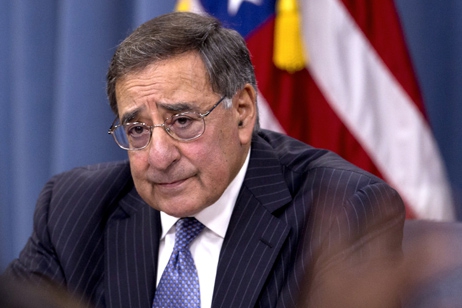 ABU DHABI // Iran's presidential election in June may hold the key to resolving the issue of its controversial nuclear programme, the former US defence secretary Leon Panetta said last night.
ABU DHABI // Iran's presidential election in June may hold the key to resolving the issue of its controversial nuclear programme, the former US defence secretary Leon Panetta said last night."Once the election happens in June then I think there is a window where a tremendous amount of pressure will be brought on�Iran�for them at that point to negotiate to come to a resolution," said Mr Panetta.
"So I think a delicate period here is going to be the period between June and September or October in which the hope is they should choose to negotiate, and if they refuse there would be a much greater pressure to take action from this part of the world."
For this reason,�Barack Obama's view was that all options in dealing with Iran remained on the table, Mr Panetta said.
Speaking at the Emirates Centre for Strategic Studies and Research about the US defence budget and Washington's global commitments, Mr Panetta said that the US response to security threats in future would depend on cooperation with other countries.
"Nato is an example of performing an important role, they did it in Libya, which has been a complicated endeavour, and yet these countries worked together, not only the Nato countries but countries of the Gulf as well," he said.
Mr Panetta said Pacific Asian countries were also forming alliances to resolve their issues on military cooperation, nuclear non-proliferation, maritime traffic and sea lanes, and the same thing has to happen with the Persian Gulf countries.
"This is something that has to happen in this region, often their foreign ministers meet together but it's time that their defence ministers actually sit down and meet to develop this kind of capability among the Gulf nations so they can work together and provide assitance to Syria and to other countries," he said.
"They can become a very effective force but they have to work together becuase utimately their self-interest rest in working with other nations to be able to provide that kind of security."
Mr Panetta described the arrival in Abu Dhabi later this week of his successor as defence secretary, Chuck Hagel, as part of a landmark regional trip.
Mr Hagel is finalising a $10 billion (Dh37.6bn) arms deal that will strengthen the UAE and Saudi Arabia's military capabilities and bolster Israel.
The deal, more than a year in the making through a series of coordinated bilateral negotiations, would result in the sale of V-22 Osprey aircraft, advanced refuelling tankers and anti-air defence missiles to Israel and 25 F-16 Desert Falcon jets worth nearly $5 billion to the UAE.
The UAE and Saudi Arabia also would be allowed to purchase weapons with "stand-off" capabilities - those that can be used to engage the enemy with precision at a greater distance.
The deal is the first time the United States has offered to sell tilt-rotor Ospreys to another country, and the "stand-off" weapons would give Saudi Arabia and the UAE a more advanced capability than they have had in the past.
Mr Panetta said he worked on this deal extensively while he was secretary of defence.
"I was working with Israel, working with the UAE and working with Saudi Arabia and the reality is there is no reason why countries like the UAE, Saudi Arabia and others cannot develop greater military capabilities so that they can become a very effective force in having to confront Iran should that be necessary," he said.
"They can also send a very important signal to Iran that this part of the world is unified against Iran and that we have the military capability to resist any military action by Iran."
Mr Panetta said that when the deal was put together the plan was not only to give a greater military capability to Israel but to give a greater military capabilty to countries in the region, so that they would have the know how and capabilty not only to defend themselves, but also to secure the region.
By The National
The Iran Project is not responsible for the content of quoted articles.











